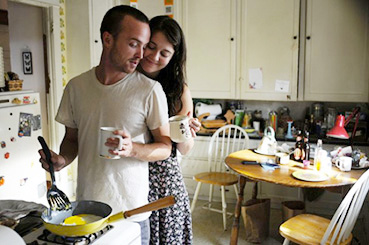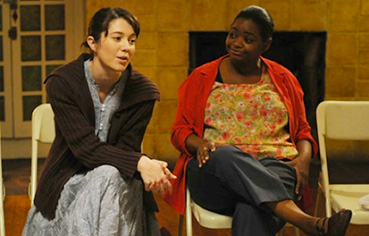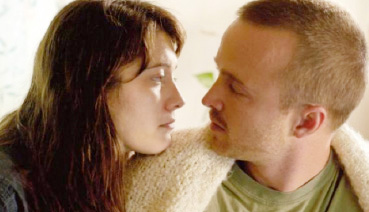|
The chucklesome title may call to mind the oeuvre of Danny Dyer and business-as-usual Saturday night larger louts on this side of the Atlantic, but there's very good reason why Smashed was one of the most buzzed about acquisitions at this year's Sundance Film Festival.
In what must be the most clear-eyed, uplifting cinematic account of the debilitating effects of alcoholism, writer-director James Ponsoldt (Off the Black) offers a fresh take on recovery from addiction and shakes up a subgenre of formidable forbearers in the process. In the company of such in inestimable classics such as The Lost Weekend, Barfly and Leaving Las Vegas the topic practically demands it, and to that end, Ponsoldt's tale of the mutually assured destruction of a barely-married couple has two distinct elements that make it stand out from the pack.
On-screen relationships with booze involved usually have the responsible partner doing all they can to keep their blottoed other half in line, before the emerging frustration from the impossibility of the task bucks their saintly patience and the union dissolves with much screaming and even more drinking. Eschewing archetypes, both members of this libatious couple are equally doomed and without sense of their own limits. It's one thing to see a couple of cohabitating, codependent alchies in a subgenre which rarely makes room for more than one boisterous personality with no impulse control, but to see two lash hounds both in their early twenties, obliterating themselves through booze is surprisingly uncommon.
When you think of screen drunks, Ray Milland in The Lost Weekend and Nicolas Cage in Leaving Las Vegas, you think of hollowed out men in crinkled unwashed clothes, permanently stained with five o'clock shadow, and a lot of years to show for it. The excessive toll of abuse known only to lifers who forgot how it all started is instantly identifiable, but the lives of the couple at the centre of Smashed are only just beginning. That they've already racked up quite a few miles on that ruinous road is deeply troubling and not immediately apparent.

You certainly wouldn't know it to look at them. While Breaking Bad's Aaron Paul has a natural sullenness that becomes Charlie, (the quietly self-loathing husband content to bother nobody but the bottle), through the gaze of Mary Elizabeth Winstead's Kate, Charlie lights up like a firework, grinning effusively at how good he's got it. And who wouldn't agree? Living in a great house paid for by wealthy parents in a hip part of town and working as a sometime music critic whenever the mood suits and he's sober enough to get to the gig, the highlight of his day is stumbling home every night to his beautiful, loving wife. Thanks to Winstead's naturally perky disposition and easygoing personality, it's impossible not to warm to Kate, very much the antithesis of drunken reprobate, so bright eyed and fresh faced it's hard to believe she's an addict. Even when we've seen her piss the bed in her bottle-strewn house and throw up in front of her elementary class all within the first ten minutes, we still can't believe it. When drink leads her to trying crack for the first time and waking up on the street, we simply don't want to.
That this all happens in such quick succession works well in selling two very attractive actors as spiraling drunks. We never struggle to believe who these people are as the depiction of their lives positively reeks of booze, vomit and authenticity. Before she signs up for twelve step salvation, Kate handily walks us through the five steps of shame as she tries to score an early morning nightcap at the local convenience store. It's two a.m. and the unlucky clerk is no longer allowed to sell her the wine she's craving. Kate asks him to turn the clock back in order to serve her, before suggesting he buy it for her as a gift that they might share. Refused again after offering oral sex, she abruptly turns from party girl irritant to sudden violence, pissing on the floor as her encore. With a constitution as weak as her bladder, it takes smitten work colleague and fellow alcoholic Dave (a dry humoured and painfully inappropriate Nick Offerman) to get her to attend AA meetings. There she meets a sponsor who's switched from liquor to pastries (The Help's Octavia Spencer), coping a day at a time with her disease by talking about it every which way. Though the steps remain the same here in the UK, the open encouragement of fortune cookie psycho analysis and continual talking is a frowned upon touchy-feeling sentiment particular to the US. On occasion Spencer's platitudinal dialogue moves her perilously close to "magical negro" status but Ponsoldt is by enlarge a perfect judge of the material, stopping it just short of condescending preachiness.

The way Ponsoldt savours Kate's smile in close-up during her more functional moments positions him as the invisible third member of Kate's newfound protective support network. Not wanting to dwell on the besmirchment of such a beautiful person, he has her hit rock bottom fairly early on, at the end of the fist act rather than the second. Understanding how films about alcoholics discombobulate and depress the viewer, the screenplay (co-written with Susan Burke) chooses to focus on Kate's desire to get clean and turn her life around. With not an ounce of self-pity in Winstead's down-but-not-out portrayal, Kate quickly becomes a character we take great pride in watching better herself.
Far from turning into a rousing feel-good movie, the look of love does not look kindly once the beer goggles come off. All the things that were once funny are now embarrassing and scary. Kate soon learns that the only thing harder than sobriety is living your life honestly. Severing the only thing she has in common with Charlie, her new reality is harsher than we might expect. The lifetime movie of the week version would surely have Kate proclaiming she no longer recognizes the man she married, but the script is penetrative enough to see that she actually has no idea why she married him in the first place.

Not content to ploy for our pity, Kate is honest and straightforward with her husband, who defensively calls her a brainwashed bitch. Charlie could so easily have been written and played as a snivelling, contentious weasel, desperately conniving to tempt her back but Paul pares it right down, making every reaction shot in their scenes together register, steadily carving out tender and telling moments that don't need to be spoken. Pathetically hopeful, he knows before he even bothers to protest that Kate will not be swayed and has no choice but to be honest with himself. Appreciating what he stands to lose, there's a moment of transparent sadness as he looks longingly at his wife, wanting nothing more than a chance to redeem himself but knowing that any talk of his going to meetings is too late to make any difference. As a husband and as an adult he's fumbled all his responsibilities and what's more, he knows he's no good at it. If Kate's disproportionate love is a constant reminder of failure, drink is the only thing that numbs it.
Knowing she's better off without him, Charlie reluctantly backs off and so to does Paul, rightly handing the film over to Winstead, who has finally found the perfect dramatic vehicle for her girl next door charms. Already a scream queen of some repute, her efforts in the otherwise wholly redundant remake of the The Thing were above and beyond what anyone might have expected. Fierce resolve and fearless determination came effortlessly, qualities redolent of Sigourney Weaver's haunted heroine in the Alien franchise and saw Winstead comfortably pushing herself beyond the tank-topped damsels in distress she'd previously played in the slasher world. Despite her valiant efforts to branch out, in the end simple genetics scuppered the young actress' chances of being taken as seriously in the role as she might have hoped. With the wholesome dream girl looks of a recent college graduate, Winstead was never going to convince as a paleontologist out in the Antarctic. This time Winstead knows exactly how to use those looks to persuade us otherwise. As its face is blurred by booze, innocence is lost, yet the beauty that remains keeps us delicately optimistic about Kate's odds of beating the demon drink.
Smashed does a conemendable job of hitting hard when it hits bottom and Winstead gives a 100 proof performance that burns on the way down. |